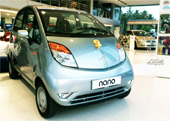An innovation lesson from India
This week’s official launch of Tata’s Nano — the world’s most inexpensive car — could be a sign of the times.
Topics

Image courtesy of Flickr user Easa Shamih (eEko) | P.h.o.t.o.g.r.a.p.h.y.
This week’s official launch of Tata’s Nano — the world’s most inexpensive car — represents not only an innovation — but perhaps also a harbinger of more innovations in the future. The Christian Science Monitor reported:
Indeed, it’s the middle class in poor nations who will be the focus of innovation for years to come, much as the Internet has spawned new businesses over the past 15 years, says Vijay Govindarajan, professor at Dartmouth College’s Tuck School of Business. “Innovating in these countries does require a fundamental shift in the price paradigm,” says Dr. Govindarajan.
Related links:
- Govindarajan has published several articles in MIT Sloan Management Review, on topics such as strategic innovation and building an effective global team.
- For more on lessons Western companies can learn from companies in developing countries, see “Surviving the Downturn: Lessons From Emerging Markets” in the current issue of

Comment (1)
chandrakant81
Dear Friend, It gives great pleasure to see an INDIAN company product/policy being appreciated world wide but at the same time ("it’s the middle class in poor nations who will be the focus of innovation for years to come") does not make any sense as India being one of the Nations showing good growth rate, it commands some respect, and for really poor nations in these times of crises need to strengthen their fundamental policies then to Innovate. As far as the innovation policy is concerned will be more required by the developed nations to keep their reputation intact. Regards Chandrakant Varma.